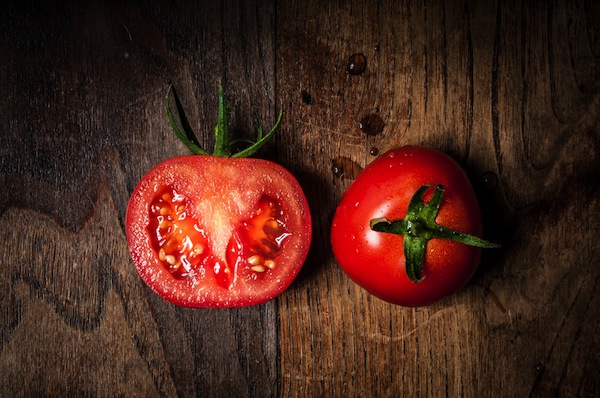
Nutrition is important not only for the maintenance of your (desired) six pack abs, but regulated intake of “brain-rich” foods may help slow disease progression of various neurological disorders. Although stroke incidence in high-income countries fell by 42% between 1970 and 2008, overconsumption of calories, and increased prevalence of obesity, metabolic syndrome, and type II diabetes mellitus continue to threaten the decline. Although several risk factors are involved in the prediction of stroke occurrence, there is one factor that you can control—your diet. Here are 5 foods that may help lower your risk of stroke or stroke recurrence:
1. Tomatoes
Time to stock up on these round reds! Tomatoes are rich in lycopene, a potent antioxidant that protects against oxidative damage to the neurons during ischemic stroke. A recent study of 1,031 Finnish men reported that those in the highest quartile of serum lycopene concentrations had 59% and 55% lower risk of ischemic stroke and all stroke respectively, compared to men in the lowest quartile. The authors noted that the increase in lycopene concentrations may be due to increased amounts of tomato and tomato-based product intake after the men’s initial diagnosis of stroke.
2. Bananas
The next time you have a bowl of cereal for breakfast, add a few slices of this potassium rich fruit into the mix. A 2011 meta-analysis of eleven observational studies assessed the relationship between the level of habitual potassium intake and the incidence of cardiovascular disease. Analysis of 247,510 adults found that those with higher potassium intake (1.64 g/day) were associated with a 21% lower risk of stroke. Another meta-analysis reported that for every 1.0 g/day increase in potassium intake, the risk of stroke decreased by 11%.
3. Fish
If you love seafood, then you are in luck. Fish is an excellent source of protein and essential omega-3 fatty acids. A meta-analysis of 15 observations studies reported that eating three servings per week of fish was associated with a 6% lower risk of stroke. Some studies suggest that the consumption of oily fish (e.g. salmon, herring, trout, mackerel) drives the inverse relationship between fish intake and stroke risk, while others support the intake of lean fish (e.g. cod, haddock, sole).
4. Whole grains
This category of food consists of bran, germ, and endosperm from natural cereal. Seven observational studies have reported that increased whole grain intake (average of 2.5 servings/day vs. 0.2 servings/day) is associated with a trend of lower risk of incident stroke events and a significantly lower risk of cardiovascular disease events. It is important to note that these findings were not found with refined grain intake.
5. Chocolate
Who doesn’t enjoy a delectable piece of chocolate from time to time? A 2011 systemic review suggests that individuals with the highest level of chocolate consumption have 29% lower rate of stroke than those with the lowest levels of chocolate consumption. In keeping with these findings, a more recent 2012 publication prospectively following 37,103 men in the Cohort of Swedish Men report that moderate chocolate consumption may lower the risk of stroke. If these claims are valid, the mechanism of association may be due to the antihypertensive, anti-inflammatory, and antithrombotic effects of cocoa.
Click Here For Article References:Image: Shutterstock/Eugenio Marongiu
Atkinson C, Whitley E, Ness A, Baker I. Associations between types of dietary fat and fi sh intake and risk of stroke in the Caerphilly Prospective Study (CaPS). Public Health 2011; 125: 345–48.
Buitrago-Lopez A, Sanderson J, Johnson L, et al. Chocolate consumption and cardiometabolic disorders: systematic review and meta-analysis. BMJ 2011; 343: d4488.
D’Elia L, Barba G, Cappuccio FP, Strazzullo P. Potassium intake, stroke, and cardiovascular disease a meta-analysis of prospective studies. J Am Coll Cardiol 2011; 57: 1210–19.
Karppi J, Laukkanen JA, Sivenius J, Ronkainen K, Kurl S. Serum lycopene decreases the risk of stroke in men: a population-based follow-up study. Neurology. 2012 Oct 9;79(15):1540-7
Larsson SC, Orsini N. Fish consumption and risk of stroke. A dose-response meta-analysis. Stroke. 2011 Dec;42(12):3621-3.
Larsson SC, Orsini N, Wolk A. Dietary potassium intake and risk of stroke: a dose-response meta-analysis of prospective studies. Stroke. 2011; 42: 2746–50.
Larsson SC, Virtamo J, Wolk A. Fish consumption and risk of stroke in Swedish women. Am J Clin Nutr 2011; 93: 487–93.
Mellen PB, Walsh TF, Herrington DM. Whole grain intake and cardiovascular disease: a meta-analysis. Nutr Metab Cardiovasc Dis. 2008; 18: 283–90.
Myint PK, Welch AA, Bingham SA, et al. Habitual fish consumption and risk of incident stroke: the European Prospective Investigation into Cancer (EPIC)-Norfolk prospective population study. Public Health Nutr 2006; 9: 882–88.
Amy Wong, MS, is a medical writer and conducts traumatic brain injury research at St. Michael’s Hospital, a large academic institution located in Toronto, Canada. She holds a Master’s of Science from the University of Toronto under the department of Pharmacology. Her studies pertained to the selective field of neuropsychopharmacology examining the biological implications of post-stroke depression. Outside of brain injury research, Amy is also involved with cancer research at the University Health Network. Currently, she is examining both genetic and environmental factors that influence individual susceptibility to hepatocellular carcinoma risk.














